While China has turned down on Monday Vietnam's protest over test flights conducted on new airstrips built on disputed South China Sea islands, Japan warned China on Tuesday of sailing into disputed islands in East China Sea.
Hong Lei, spokesperson of China's Foreign Ministry, insists that he country has undisputed sovereignty over Nansha Islands and the adjacent waters. Two tests flight on Jan. 6 landed and took off from the southernmost airport of Nansha's Yongshu Jiao which Hong says is part of China's territory.
Besides Vietnam, the Philippines and other Asian nations are also claiming the islands which Beijing says it is developing for humanitarian use, including for emergency landings and maritime rescue.
As a result of the test flights, Civil Aviation Authority of Vietnam Director Lai Xuan Thanh wrote a protest letter to Beijing and to the UN International Civil Aviation Organization. But Hong says that Lai's accusation the flights were threats to safety of all flights in the region were baseless.
In a press conference, Hong says, "Vietnam's claims that it has not received notification from China does not conform to the facts," quotes Sina.
The next day, it was China's turn to be told not to enter Japanese waters. In a news conference, Japanese Chief Cabinet Secretary Yoshihide Suga was quoted as saying, "If a foreign naval vessel transits our waters for (purposes) other than 'innocent passage', we will order a sea patrol and take the steps of having the Self-Defense Force unit order withdrawal."
The islands on East China Sea are called Senkaku by Japan and Diaoyu by China. In November, Chinese naval vessels sailed near these disputed islands. Like the Spratlys, as the Philippines calls Nansha, China insists the islands on East China Sea belong to the country since ancient times.
Hong says that while Beijing does not want tension to escalate in the region, it is willing to manage, control and resolve the issue through dialogue and consultations, but not to submit itself to international arbitration.



























